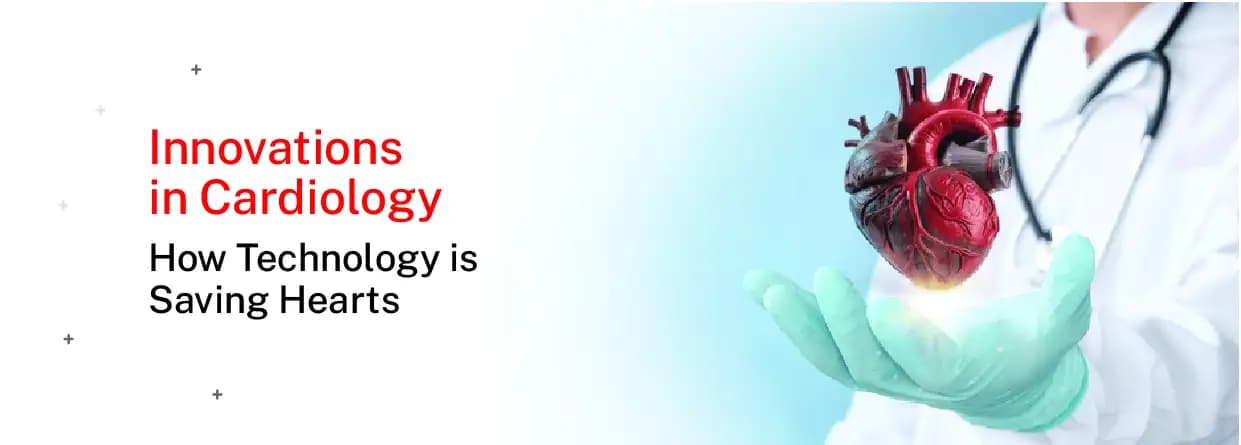
The last two decades have seen extraordinary advancements in cardiology, including innovations in medications, diagnostics, and therapeutics. However, Cardiovascular Diseases (CVDs) remain the leading cause of death globally. In India, 1 in 4 deaths occur due to heart-related problems.
The last two decades have seen extraordinary advancements in cardiology, including innovations in medications, diagnostics, and therapeutics. However, Cardiovascular Diseases (CVDs) remain the leading cause of death globally. In India, 1 in 4 deaths occur due to heart-related problems.
Reports state that more than 80% of this death rate is caused by stroke and coronary artery diseases. As India struggles with the burden of growing cardiac diseases,cardiologists are looking at advanced technologies to improve patient experience and overall outcomes.
The advancements of innovation in heart care offer a new treatment approach that can save lives and extend lifespan while addressing a wide range of heart problems.
In the past, the treatment of structural heart diseases have had various difficulties as the option we had was an invasive open heart surgery, which poses high risks and longer recovery. Some patients were not the right candidates for open heart surgery due to their age and overall health.
The absence of advanced treatment options left them with fewer options for therapy. The need for reevaluation opened the door for innovation. Below we will discuss some of the most revolutionary inventions that shaped heart-related diseases.
Many people imagine robotic heart surgery as a robot performing the operation on its own, but in reality, the surgeon is in full control. Through a special console, the surgeon operates robotic arms that provide a magnified 3D view and extremely precise, steady movements through tiny keyhole incisions. The robot simply enhances what the surgeon can already do.
Because the procedure avoids large chest cuts, it causes less trauma to tissues, leading to reduced pain, smaller scars, shorter hospital stays, and a quicker return to normal activities.
Robotic technology is now being used for several heart procedures, including valve repair or replacement, coronary bypass in selected cases, removal of cardiac tumours, and correction of structural defects. Although this technique offers major benefits, it requires highly specialised training, and not all patients are ideal candidates.
Transcatheter Aortic Valve Replacement, popularly known as TAVR and Transcatheter Mitral Valve Repair (TMVR) are groundbreaking surgical treatments in cardiovascular medicine. These are minimally invasive procedures in which a catheter is inserted into a blood artery and guided to the heart.
After that, the old valve is either repaired or replaced with a new one. For patients who were earlier considered high risk for open heart surgery, TAVR and TMVR are the best options for them, providing quicker recovery, fewer problems, and better results.
Structural Cardiac Implants: Innovation in implantable technologies has also revolutionised cardiology. Left Ventricular Assist Device (LVAD) and Atrial Septal Defect (ASD) closure devices have greatly helped patients with structural heart disease.
LVAD helps the heart pump better when the patient hasheart failure. Some patients can use this device for their heart transplants. However, the doctor uses ASD closure devices to close holes in the heart' walls to prevent irregularities in blood flow.
Artificial intelligence and Machine learning have revolutionised every field, not just cardiology. AI image analysis abilities have made it easy to recognise structural abnormalities, significantly increasing the accuracy of identifying cardiac problems.
With the help of AI and ML applications, cardiologists can examine the data of various patients and find early cardiac issues, predict the development of diseases, and improve treatment strategies and approaches.
3D printing technology has helped cardiologists to provide personalised treatment to patients. This technology allows doctors to correct difficult treatments by building cardiac models tailored to each patient.
With this advancement in cardiology, the doctor can create personalised implants and prostheses, ensuring better fit and results. 3D printing technology can be used with imaging techniques such as CT and Echocardiography to build models.
Above are the prime examples of advancements in healthcare technologies, improving diagnostic precision and offering more personalised treatment modalities, improving overall results.
If you are at risk of developing heart disease, experience any signs or symptoms of heart problems like chest pain and discomfort, or a breathless, slow heartbeat, you can book an appointment and consult our cardiologist.
The Cardiology Department at RBH Hospital is a super specialty branch, offering round-the-clock diagnostics and therapeutic services for heart patients.
These include Peripheral Angioplasty, Endovascular Revascularisation, Arteriovenous (AV) fistula construction, Peripheral Bypass surgeries, and Deep Vein thrombosis (DVT) treatment.
Our department focuses on providing immediate medical care for critical patients including treatments for all kinds of cardiovascular diseases for paediatrics and adults through a multidisciplinary approach.
We have a highly qualified and experienced team of consultants with expertise in performing simple to complex cases, the team is well-trained with paramedical and nursing staff, and state-of-the-art technology.
Robotic surgery is the latest advancement in cardiology. This surgery allows heart surgeons to perform complex surgeries with precision and accuracy, resulting in less bleeding, quick recovery, and reduced scarring.
AI and ML of the electrocardiogram can identify structural heart diseases and help improve treatment and outcomes.
Patients can consult the doctor from the comfort of their homes with the help of telemedicine. It also helps in managing high blood pressure and diabetes. It allows remote monitoring of the patient, improves patient engagement, and saves time and money for patients and doctors.
Written and Verified by:

Dr. Alok Mathur is the Director of CTVS Dept. at CK Birla Hospital, Jaipur, with over 26 years of experience. He is a specialist in paediatric cardiac surgery, heart failure and transplant surgery, as well as minimally invasive cardiac procedures.
Similar Cardiac Sciences Blogs
Book Your Appointment TODAY
© 2024 RBH Jaipur. All Rights Reserved.